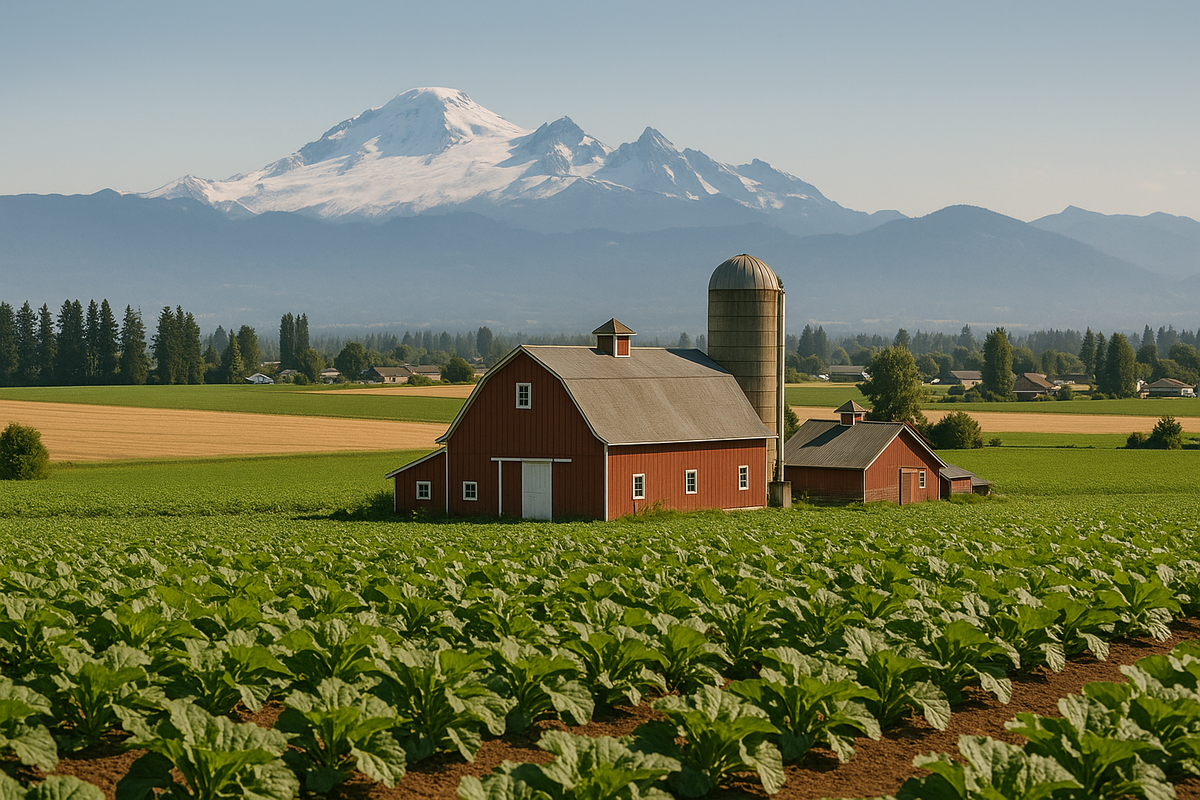
By Jenny Holly Hansen | WBN News | April 30, 2025
Nestled in the heart of the Fraser Valley, Abbotsford is often referred to as the "Agricultural Capital of Canada"—a title it has more than earned. With sweeping fields, fertile soil, and a community deeply connected to the land, agriculture is not just part of Abbotsford’s history—it’s a defining feature of its identity, economy, and culture.
A Legacy That Grew From the Ground Up
Abbotsford's agricultural roots trace back over a century, when settlers were drawn to the region’s mild climate, abundant rainfall, and nutrient-rich soil. Early European settlers began cultivating the land in the late 1800s, building small family farms that grew staples like hay, oats, and potatoes. Over time, the community expanded, and so did the diversity of its crops and livestock.
One of the region’s earliest and most influential milestones came with the development of the Sumas Prairie, an area that was once a vast lake. In the early 1920s, the Sumas Lake was drained to create fertile farmland, a controversial but transformative move that added tens of thousands of productive acres to the region. That act alone significantly boosted Abbotsford’s agricultural capacity and reinforced the city’s deep relationship with the land.
The Breadbasket of British Columbia
Today, Abbotsford is home to more than 1,300 farms and over $1.8 billion in annual agricultural production, making it the most productive farming community per capita in Canada. From dairy and poultry to berries and greenhouse vegetables, the city produces a wide variety of goods that feed both the province and the nation.
Some of the standout crops and industries include:
- Blueberries: Abbotsford is one of the largest blueberry-producing regions in North America, known for its sweet, plump berries that are exported globally.
- Dairy and Poultry: Home to numerous family-run dairy farms and chicken producers, Abbotsford is a key player in B.C.'s animal agriculture sector.
- Greenhouses and Nurseries: Innovations in greenhouse technology have allowed local growers to produce fresh vegetables and ornamental plants year-round.
The city’s annual Agrifair, a beloved community tradition, celebrates these achievements with livestock exhibitions, farm machinery displays, and educational events that honour the hard work of local farmers.
Innovation Meets Tradition
While Abbotsford’s farming legacy is rooted in tradition, it’s also a place of innovation. Farmers here have embraced new technologies and sustainable practices—from drone crop monitoring and automated milking systems to regenerative soil management. The city has also become a hub for agri-tech start-ups and educational initiatives, thanks in part to institutions like the University of the Fraser Valley, which offers programs in agricultural science and environmental sustainability.
This fusion of heritage and innovation ensures that Abbotsford’s agricultural sector remains competitive, efficient, and future-ready.
A Community Sustained by the Land
Agriculture in Abbotsford isn’t just an industry—it’s a way of life. Generations of families have worked the same land, passing down knowledge and values rooted in stewardship, hard work, and resilience. Local farm markets, roadside stands, and agritourism experiences connect residents and visitors alike with the bounty of the region. Whether it’s picking berries at a U-pick field, touring a working dairy farm, or sipping fresh apple cider in autumn, Abbotsford offers countless ways to engage with its rural spirit.
Looking Ahead
As Abbotsford grows, the challenge of balancing urban development with agricultural preservation becomes increasingly important. The city has taken steps to protect farmland through zoning regulations, community consultations, and partnerships with organizations like the Agricultural Land Commission. These efforts reflect a shared understanding: agriculture is not just part of Abbotsford’s past, but vital to its future.
Final Thoughts
Abbotsford’s rich agricultural heritage is more than a historical footnote—it’s a living, breathing force that continues to shape the community every day. It reminds us that progress and preservation can coexist, that innovation can enhance tradition, and that the land we walk on is not just soil—it’s the foundation of our shared story.
Let’s Keep Talking:
Jenny is a business insurance broker with Waypoint Insurance.
She is also a business development consultant with Impresario Partners, helping Canadian Business expand overseas.
She can be reached at 604-317-6755 or jholly-hansen@wbnn.news. Connect with Jenny on LinkedIn at https://www.linkedin.com/in/jenny-holly-hansen-365b691b/. Connect with Jenny at BlueSky: https://bsky.app/profile/jennyhollyhansen.bsky.social
Let’s Meet Up:
Jenny Holly Hansen is a cohost with Chris Sturges of the Langley Impact Networking Group. You are welcome to join us on Thursday’s from 4pm to 6pm at: Sidebar Bar and Grill: 100b - 20018 83A Avenue, Langley, BC V2Y 3R4
TAGS: #Jenny Holly Hansen #Abbotsford is Awesome #Rich Agricultural Heritage #Sumas Prairie #Annual Agrifair


